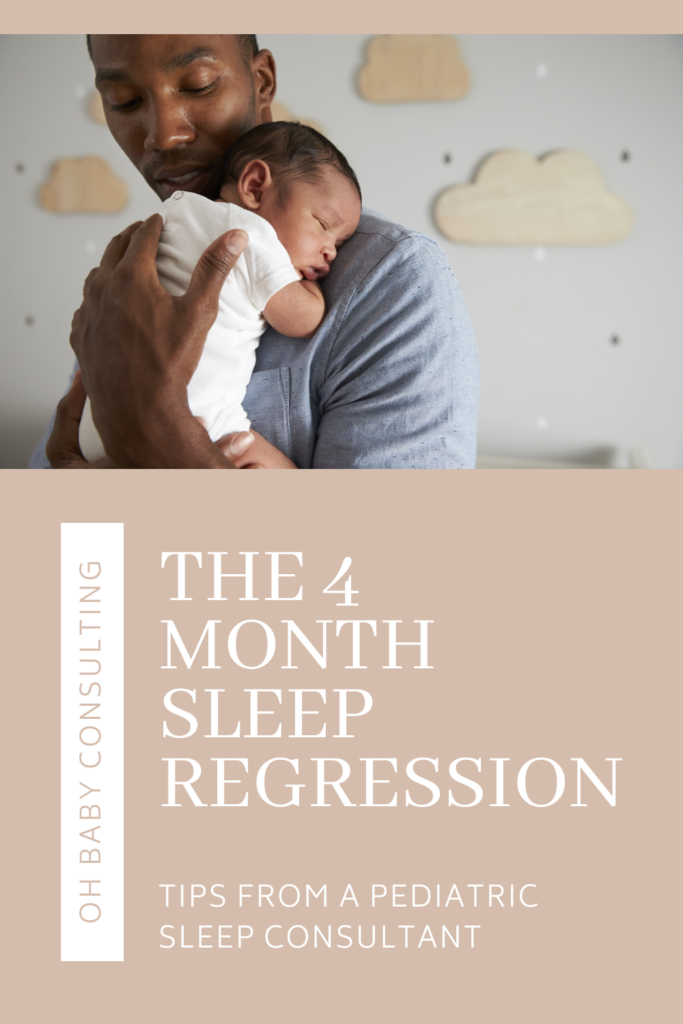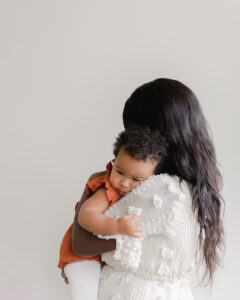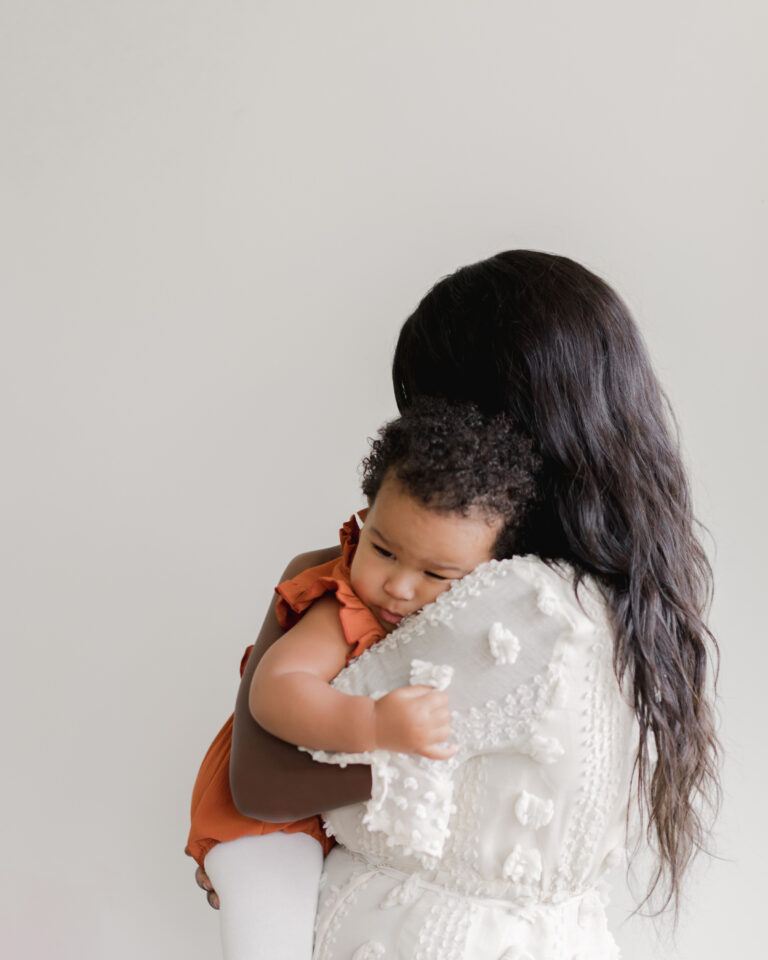I often hear parents throwing around the phrase “sleep regression” and wondering if the “X month regression” is the reason their baby isn’t sleeping through the night. Most regressions are attributable to either illness, teething, or milestone developments – be they physical, cognitive, or social-emotional – and should resolve themselves within a week or two assuming your little one had good sleep skills to begin with. However, there is one regression that is different from the rest as it is the only true biological regression and a total reorganization of the body and the brain. That, my friends, is the four-month sleep regression.
I want to take some time to break down what exactly is going on developmentally around this time and why your previously angelic sleeper may now be keeping you up all night.
[By the way, I independently source and vet any products that I choose to share on my site. If you buy from some of the links I’ve provided, I may receive a small commission, which in turn supports my work.]
The science behind the 4 month sleep regression
Many people think of sleep in black-and-white terms: you’re either asleep, or you’re not. In reality, this cannot be farther from the truth. We all sleep in stages ranging from light to deep and these different stages make up a “sleep cycle” that we transition through several times each night.
When babies are born, their sleep is drastically different from the sleep of adults. Newborns really only have TWO stages of deep sleep whereas adults have FOUR stages ranging from very light to very deep. Because your newborn sleeps so deeply, it is easier to transfer them from your arms to a bassinet without waking them, and to keep them sleeping in all types of situations. When your baby undergoes the biological shifts that occur around four months, they “graduate” from the two-stage cycle they were born with to a four-stage cycle that they will follow for the rest of their lives.
Why is my good sleeper suddenly up all night long?
With the shift to a 4-stage sleep cycle, babies are no longer “sleepy newborns” and are spending more time in lighter stage of sleep. (Note: light stages of sleep are equally important parts of the sleep cycle as deeper stages of sleep. REM sleep – where the brain is consolidating information and storing memories – is one such critical light stage of sleep.)
Naturally, spending less time in deep sleep means that there is more potential to be woken both from environmental factors (like surrounding sounds or light) and natural occurrences (like the biologically normal “partial wake up” period between sleep cycles.)
In between sleep cycles, there is a period where we all “come to the surface” of sleep and this brief awakening is one that we don’t remember the next morning as long as certain comforting truths are in place: we are in our beds, it is still dark out, and we have hours to sleep until morning. These periods of transition are so brief and so benign, that we have no conscious memory of them when we wake the next day.
Infants experience similar sleep patterns and will “come to the surface” of sleep just as often as we do as adults. But let’s say you nursed (or rocked, or held, or cuddled) your little one to sleep and put them down in their crib once you were sure they were deeply in dreamland. When they later awaken between their cycles, even briefly, chances are you are no longer nursing them (or rocking, or holding, or cuddling them). Suddenly, they are in a situation that is vastly different than the one in which they fell asleep. This is no doubt going to be startling and cause a full-blown wake-up instead of a simple transition into another sleep cycle.
Also happening around this time is a cognitive surge where infants become much more aware of their surroundings. That means that those infants who rely heavily on external strategies to fall asleep (nursing, rocking, bouncing, etc.) are more likely to protest when those things are absent during the night. They strongly believe they need those specific circumstances to be able to make sleep happen for themselves.
Up until now, you could have been sailing through, rocking your baby to sleep and everything had been fine. But, if your little one believes they need certain circumstances to fall asleep, these developmental changes can cause major problems.
But the 4-month regression isn’t all bad! In fact, it’s a time of huge opportunity. Your baby now has a more mature circadian rhythm and biological clock; they are now capable of sleeping longer stretches because they can go longer between feeds; and they can now follow a more appropriate sleep-wake schedule. The possibilities are endless, so here are a few things that I recommend to help encourage better sleep.
7 tips for navigating the 4 month sleep regression
1. MAKE THE ROOM DARK
Now that your baby is no longer a “sleepy newborn” they will be less able to sleep whenever, wherever! Darkness plays a huge role in cuing our body clocks that it is time for sleep whereas light signals to our bodies that it is time to be awake. If you can make your baby’s sleep environment pitch black, it will go a long way in making sure that our efforts to get them sleeping better are working with their body vs. against it. These are my favorite blackout shades if you’re looking some!
2. USE A SOUND MACHINE
Because your baby is spending more time in a lighter sleep, white noise can block out any jarring environmental sounds that could pull them into full wakefulness.
If you're looking for a good sound machine, I highly recommend either the Dohm or the Hatch!
3. HAVE A CONSISTENT BEDTIME ROUTINE
Routines cue the body and brain that we are transitioning out of day and into the night. This is true for adults too (think about your bedtime routine, and even how you fall asleep: which side of bed you have to be on, what’s on your nightstand, what position you lay in, etc.) When structuring your routine, think about offering a feeding towards the beginning or middle of the routine rather than at the end. This minimizes the chances that baby will fall asleep at the breast or bottle which can perpetuate the dreaded cycle of needing you to repeat the bedtime process all. night. long.
4. CHOOSE AN EARLY BEDTIME
Based on research, most infants’ body clocks trend towards a bedtime between 6-8pm so don’t try to fight nature. There are many other benefits to an early bedtime including minimizing overtiredness, maintaining age-appropriate recommendations of 11-12 hours of nighttime sleep, and allow YOU to have some uninterrupted time in the evenings to do…whatever you want!
5. BE MINDFUL OF WAKE WINDOWS
Consolidated nighttime sleep is aided by honoring daytime sleep. Being cognizant of how long your little one can tolerate being awake between sleep periods will help to prevent overtiredness which can lead to poor sleep quality. Around 4 months, infants can only tolerate about 2 hours of time awake before they are going to start to get overtired, so being mindful of wake windows will help set them up for success.
6. PUT YOUR BABY DOWN AWAKE AND TEACH THE SKILL OF INDEPENDENT SLEEP
This is the trickiest but more important part because this is not a regression that just goes away on its own. The changes that occur around 4 months are permanent changes to the way your baby sleeps. By teaching sleep independence, your little one will learn that they are in charge of making sleep happen for themselves. This prevents them from thinking they always need someone or something else to fall asleep. We don’t want you to get stuck in a cycle where you’re going to have to come in throughout the night to recreate the situation that got you baby to sleep in the first place; we want you and your baby to be able to sleep soundly.
By the way, this is not something that you want to just “wing.” When sleep training, you want to make sure you have a PLAN so you can approach the process in a fair way for your baby. Inconsistency breeds confusion, confusion causes crying, overwhelm, and frustration, and then no one will get any sleep.
7. PRACTICE PAUSING DURING NIGHT WAKE UPS
If your little one cries out in the middle of the night, wait a few moments before intervening. Babies are known to be loud as they transition from one sleep cycle to the next, so going in too soon can cause you to unintentionally wake them further. This also gives your baby the opportunity to try to get back to sleep on their own.
Regressions are bound to happen, but I’m here to help you navigate the extra tricky ones. If you’re looking for guidance and support in coming up with and executing a sleep training plan, 1:1 Infant Sleep Coaching is a great option.














